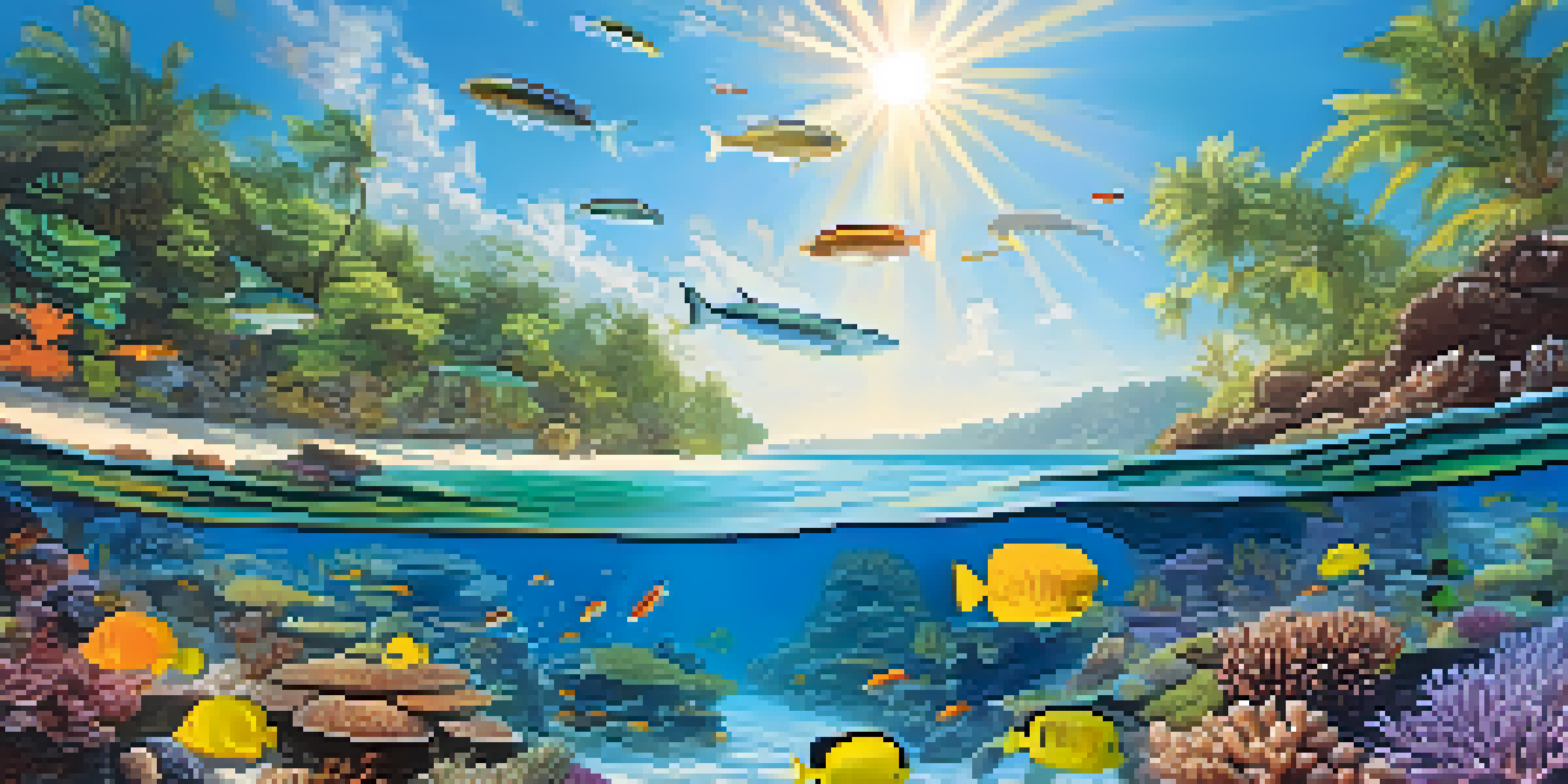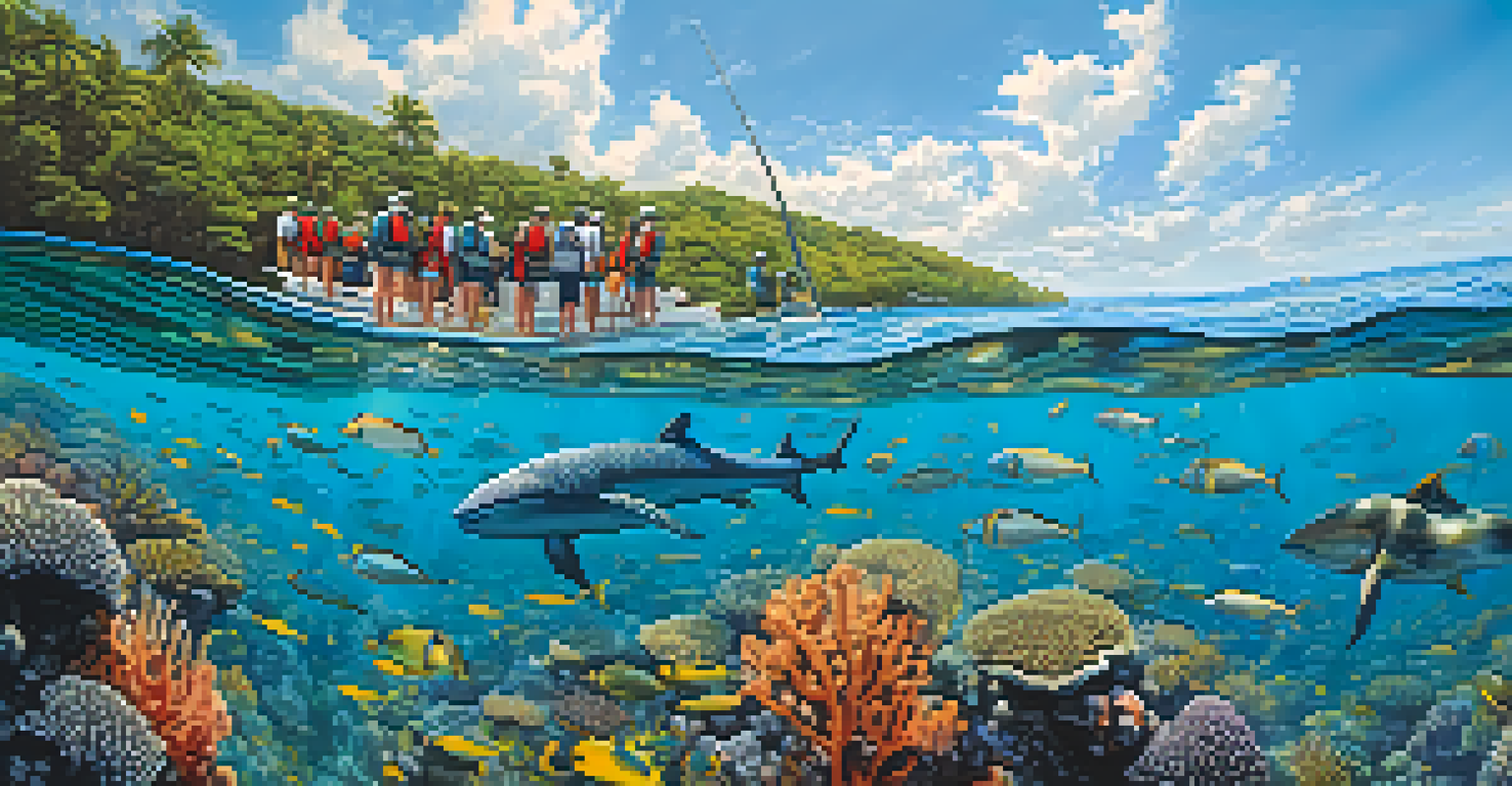The Role of Ecotourism in Marine Conservation Efforts

Understanding Ecotourism and Its Importance
Ecotourism is a responsible travel approach that focuses on preserving natural environments while benefiting local cultures. It encourages travelers to engage with nature and observe wildlife without causing harm. By promoting sustainable practices, ecotourism plays a crucial role in conservation efforts, especially in delicate marine ecosystems.
The greatest threat to our planet is the belief that someone else will save it.
Unlike traditional tourism that often leads to environmental degradation, ecotourism prioritizes conservation. For instance, visitors may participate in guided snorkeling tours that educate them about coral reefs while helping to fund their protection. This creates a win-win situation where tourists enjoy breathtaking experiences while contributing to marine health.
Moreover, ecotourism often fosters a sense of stewardship among travelers, transforming them into advocates for conservation. When people witness the beauty of marine life firsthand, they are more likely to support initiatives aimed at preserving these environments. This emotional connection can drive lasting change in attitudes and behaviors towards marine conservation.
Economic Benefits for Coastal Communities
One of the most significant advantages of ecotourism is its ability to provide economic opportunities for local communities. By attracting visitors to marine destinations, communities can generate income through activities such as guided tours, lodging, and local cuisine. This economic incentive encourages residents to protect their natural resources rather than exploit them.

For example, in places like Belize, ecotourism has led to the establishment of marine protected areas that not only safeguard biodiversity but also create jobs for locals. Fishermen can transition to tour guides, showcasing their knowledge of the sea while benefiting from a sustainable source of income. This shift can lead to improved livelihoods without compromising the health of marine ecosystems.
Ecotourism Preserves Marine Life
Ecotourism promotes responsible travel that protects natural environments and supports local cultures.
Additionally, the revenue generated from ecotourism can be reinvested in conservation initiatives, education, and community development. This holistic approach ensures that the benefits of tourism extend beyond immediate financial gains, fostering a culture of sustainability and environmental responsibility within communities.
Supporting Marine Research and Education
Ecotourism provides valuable funding and support for marine research and education, which are vital for effective conservation strategies. Many ecotourism operators collaborate with scientists to monitor marine ecosystems, contributing data that can inform conservation practices. This partnership creates a bridge between tourism and scientific research.
Travel far enough, you meet yourself.
Moreover, ecotourism often includes educational components that raise awareness about marine conservation issues. Travelers learn about the importance of coral reefs, the impact of climate change, and the necessity of protecting endangered species. This knowledge empowers them to make informed choices and advocate for marine conservation after they return home.
By fostering a deeper understanding of marine environments, ecotourism not only enhances the travel experience but also cultivates a generation of environmentally conscious individuals. As these travelers share their experiences, they can inspire others to appreciate and protect marine ecosystems, amplifying the impact of ecotourism.
Conservation Success Stories Through Ecotourism
There are numerous success stories showcasing how ecotourism has positively impacted marine conservation efforts. One notable example is the Galápagos Islands, where regulated ecotourism has helped fund conservation programs while simultaneously educating visitors about the unique ecosystems. This model has played a crucial role in protecting the biodiversity of the islands.
Another inspiring case is found in the Florida Keys, where ecotourism initiatives have led to the restoration of coral reefs. Tour operators collaborate with conservation organizations, allowing tourists to participate in coral planting activities. This hands-on experience not only aids in reef recovery but also deepens tourists' appreciation for marine ecosystems.
Economic Benefits for Locals
Ecotourism generates income for coastal communities, encouraging sustainable practices and job creation.
These success stories highlight that with thoughtful planning and community involvement, ecotourism can lead to meaningful improvements in marine conservation. By aligning economic interests with ecological goals, these initiatives demonstrate that sustainable tourism can be a powerful tool for preserving our oceans.
Challenges Facing Ecotourism and Marine Conservation
While ecotourism has many benefits, it also faces challenges that can hinder its effectiveness in marine conservation. Issues such as overcrowding, environmental degradation, and insufficient regulation can undermine the very ecosystems that ecotourism aims to protect. Without careful management, the influx of tourists can lead to habitat destruction and pollution.
Additionally, not all ecotourism practices are genuinely sustainable. Some operators may market themselves as ecotourism while engaging in activities that harm marine environments. It's essential for travelers to research and choose responsible operators committed to conservation. This discernment helps ensure that their travel choices positively impact marine conservation.
Collaborative efforts between governments, NGOs, and the tourism industry are crucial in addressing these challenges. By implementing regulations, monitoring tourism impacts, and promoting best practices, stakeholders can create a more sustainable ecotourism framework that benefits both marine environments and local communities.
The Role of Technology in Ecotourism
Technology plays a transformative role in enhancing ecotourism and marine conservation efforts. From online booking platforms that promote responsible travel options to apps that track wildlife sightings, technology helps connect travelers with sustainable experiences. This accessibility makes it easier for tourists to choose eco-friendly options.
Moreover, technology facilitates better data collection and monitoring of marine ecosystems. Drones and underwater cameras can provide insights into coral health and fish populations, allowing researchers to analyze trends over time. This information is invaluable for developing effective conservation strategies and ensuring the sustainability of marine resources.
Education Fuels Conservation Efforts
Ecotourism enhances awareness of marine conservation issues, empowering travelers to advocate for protection after their trips.
Social media also serves as a powerful tool for raising awareness about marine conservation. Travelers can share their experiences, advocate for sustainable practices, and inspire others to appreciate the beauty of marine ecosystems. This digital storytelling can amplify the message of conservation, encouraging a broader audience to support ecotourism initiatives.
How to Get Involved in Ecotourism
Getting involved in ecotourism is a rewarding way to contribute to marine conservation while enjoying unique travel experiences. Start by researching destinations that prioritize sustainability and support local communities. Look for operators that have certifications from recognized eco-labels, ensuring they adhere to responsible practices.
Consider participating in volunteer programs that focus on marine conservation projects. Activities such as beach cleanups, coral restoration, and wildlife monitoring not only provide hands-on experience but also allow you to connect with like-minded individuals passionate about the ocean. These programs often offer immersive learning opportunities that deepen your understanding of marine ecosystems.

Finally, remember that even small travel choices can make a difference. Opt for eco-friendly accommodations, minimize plastic use, and respect wildlife regulations during your travels. By being a responsible traveler, you can contribute to marine conservation efforts and support the communities that rely on healthy marine environments.